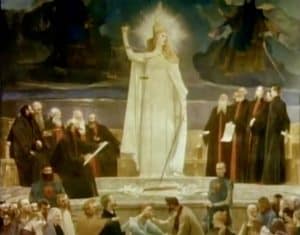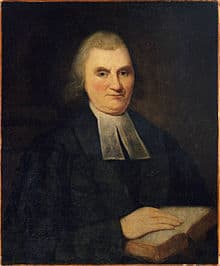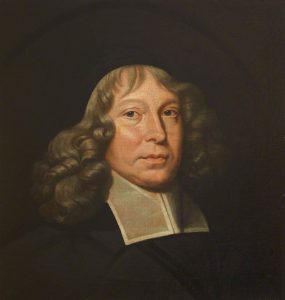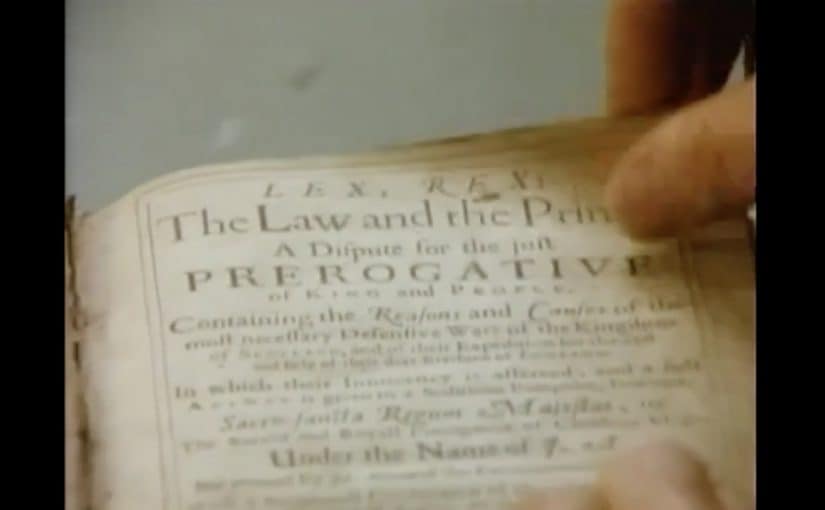In part 5 of Francis Schaeffer’s monumental 10-part film series titled How Should We Then Live?, the Christian philosopher shows how Christianity, through the Reformation’s strong influence, gave rise to American liberty.

What Paul Robert painted for the justices in the Supreme Court building in Lausanne [Switzerland], Samuel Rutherford of Scotland put down in writing in 1644. It provided the people with a base for effective political control of their sovereign: Lex Rex — Law Is King. Freedom without chaos because there is form. Or, said in another way, a concept of law, rather than the arbitrary governments of men — because the Bible was there as the final authority, as a base.
Lex Rex — Law Is King. Freedom without chaos because there is form.
—Francis Schaeffer—

Samuel Rutherford’s work and the tradition it embodied had a great influence on the American Constitution, even though modern Americans have largely forgotten him and his influence. John Witherspoon, president of Princeton University, member of the Continental Congress, and one of the signers of the Declaration of Independence, followed Samuel Rutherford’s Lex Rex directly.
Thomas Jefferson picked up his Christian teaching in secularized form from John Locke, the English philosopher who stressed
-
-
-
-
- unalienable rights,
- government by consent,
- separation of powers, [and]
- the right of revolution.
-
-
-
Writing on the same subject some time later, Dr. Schaeffer said this:
Lex rex means “law is king”—a phrase that was absolutely earthshaking. Prior to that it had been rex lex, the king is law. In Lex Rex he [Rutherford] wrote that the law, and no one else, is king. Therefore, the heads of government are under the law, not a law unto themselves.
POINTS FOR DISCUSSION
-
- The law is king. Of course, the law Samuel Rutherford was writing about was the law of God. How can God’s law be “king”? What does it look like for God’s law to be king? What do most people today think it looks like?
- Explain how the concept that the law is king, when properly applied, benefits the nation that applies it.
- The phrase freedom without chaos because there is form is important. What does freedom mean in this context? What keeps it from degenerating into chaos? What does form look like? What makes all of this possible?
- Dr. Schaeffer named four principles that Jefferson derived from John Locke that are consistent with biblical teachings. How is each of these consistent with biblical teachings? Here is some help on the third item.
- Dr. Schaeffer mentions “the right of revolution,” but the Bible does not authorize efforts to overthrow or replace government arbitrarily. In fact, it urges obedience to governmental authority. Under what circumstance might “the right of revolution” apply in a biblical sense?
- Describe why the idea that “the law is king” would replace the idea that “the king is law” was so earthshaking.
- How does the concept Lex Rex keep tyranny in check?
Group assignment: In a few sentences, summarize the implications of the concept promoted by the phrase Lex Rex.
Interesting fact: While the concept of Lex Rex includes the republican ideal that both the nation’s leaders and her citizens live under the laws of the nation and must be held accountable to them, the more significant meaning is that all are under God’s law and are accountable to God.

This page is part of a larger article and series of articles. Copyright © 2020 by B. Nathaniel Sullivan. All rights reserved.
